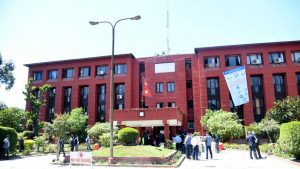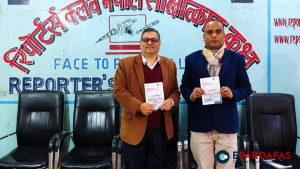
Pollution from cement factory sickens locals in Dhading

Locals in and around Jugedi at Dhunibeshi Municipality-9 in Dhading district have begun developing respiratory-related complications due to the air pollution caused by a cement factory in their locality.
Locals have begun falling sick due to smoke, dust and noise pollution emanating from the United Cement Industry. They are suffering from health issues such as boils and rashes all over the body, itching and dry throat.
Furthermore, skin-related issue such as allergy is another health problem the locals are putting up with as the cement industry functions unchecked. According to them, the health hazards they were bearing with were because the industry was not running in compliance with the standards of industrial operation.
It may be noted that the cement industry is considered to be one of the largest sources of industrial air pollution.
Laxmi Rai, one of the estimated 230 directly affected locals at Jugedi, bemoaned, “If the pollution coming from the cement industry would not stop, we will not be able to reside here anymore. We will have to shift from here to elsewhere to protect our lives.”
Over 50 of the locals are currently undergoing treatment related to throat, skin and eyes, locals shared. While many of the affected locals were availing medical attention on their own, some were availing treatment in the presence oat the expenses borne by the management of the cement industry.
Affected locals complained that when they go to the healthcare facility, the cement industry management-related people were found to put healthcare service providers under pressure. Worst of all, the affected ailing locals were not allowed to see their own medical reports.
Rai shared that she had her health examined in Kathmandu-based Bir Hospital after she received boils and suffered a dry throat. The medical report was not given to her yet.
“The cement industry management-related person got the ticket for the Hospital. Then two of us went for an examination. Without showing us the medical report, we were told that our condition was good,” she narrated.
She further lamented, “When we insisted them to give us our report, they promised us to send that to our doorstep but to no avail. ”We were not allowed to see our medical report.”
The doctor told them that nothing was amiss with them while they underwent lab tests for blood, urine and other bodily fluids. “We could not find out whether we had contracted any infection or not or if the doctors were forced to conceal our report under pressure from the cement industry management related people,” doubted Rai.
Shova, her husband and son are regularly taking medicines for allergies. However, the doctors have not disclosed the reasons for the allergy, she said.
The industry was brought into operation around six years back, and its impacts are gradually exhibiting in the local people, said the locals. Elderly people are suffering from asthma, said a local Ramesh Rai. Pollution from the industry has had its implications also on the crops.
“The pollution have affected human health as well as agriculture. As a result of pollution, crops are not growing good.
They cannot be edible. Cement dust is seen coating the green vegetable leaves. Agricultural producers have started declining,” said Ramesh.
Facing the brunt of the industry, the local people have launched a protest against it. The protesting team led by a local Rama Rai submitted a memorandum to the industry and Dhunibensi Municipality in protest.
“After the industry denied providing the environmental impact assessment (EIA) report, we have by ourselves obtained it from the National Information Commission. Some eight months ago, we also held a discussion with the people’s representatives and the industry management. At that time, the management assured that they would blacktop or lay concrete slabs on the road leading to the industry.
Although the industry management has been called for a talk through the judicial committee of the municipality, it is ignoring to come,” he said. The residents of Dhunibensi wards 2, 5 and 9 are bearing the brunt of the pollution from the industry.
However, the cement industry has claimed that the industry is being run following the standards set by the government.
Following complaints about pollution, some people of the village and the industry employees were taken to the local hospital for a health test, said a chief executive officer of the industry, Bharat Dahal. The process of carrying out the EIA has started, he said. As more dust is emanating from the industry, work is underway to check and fix the problem after bringing a technical team from India, he said.












Comments